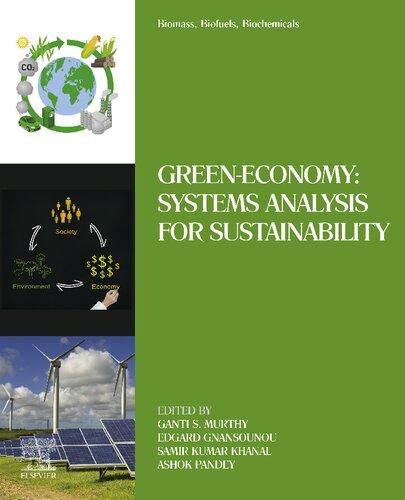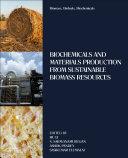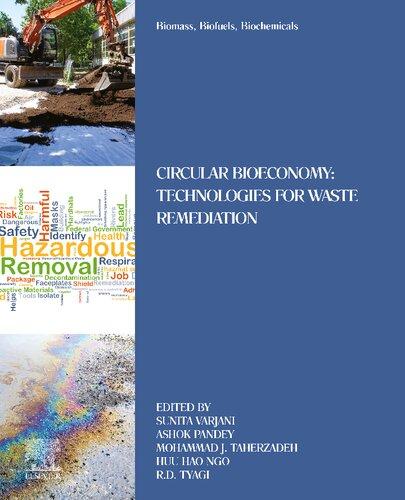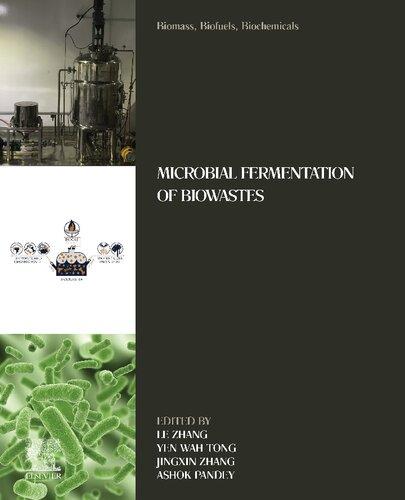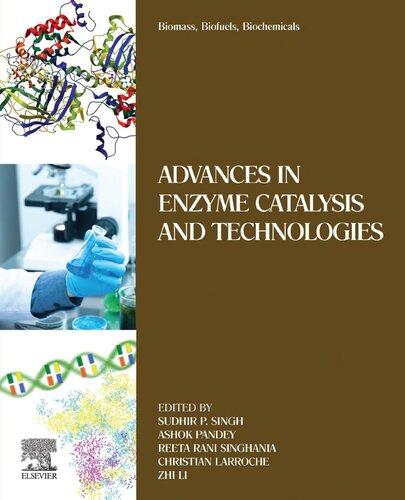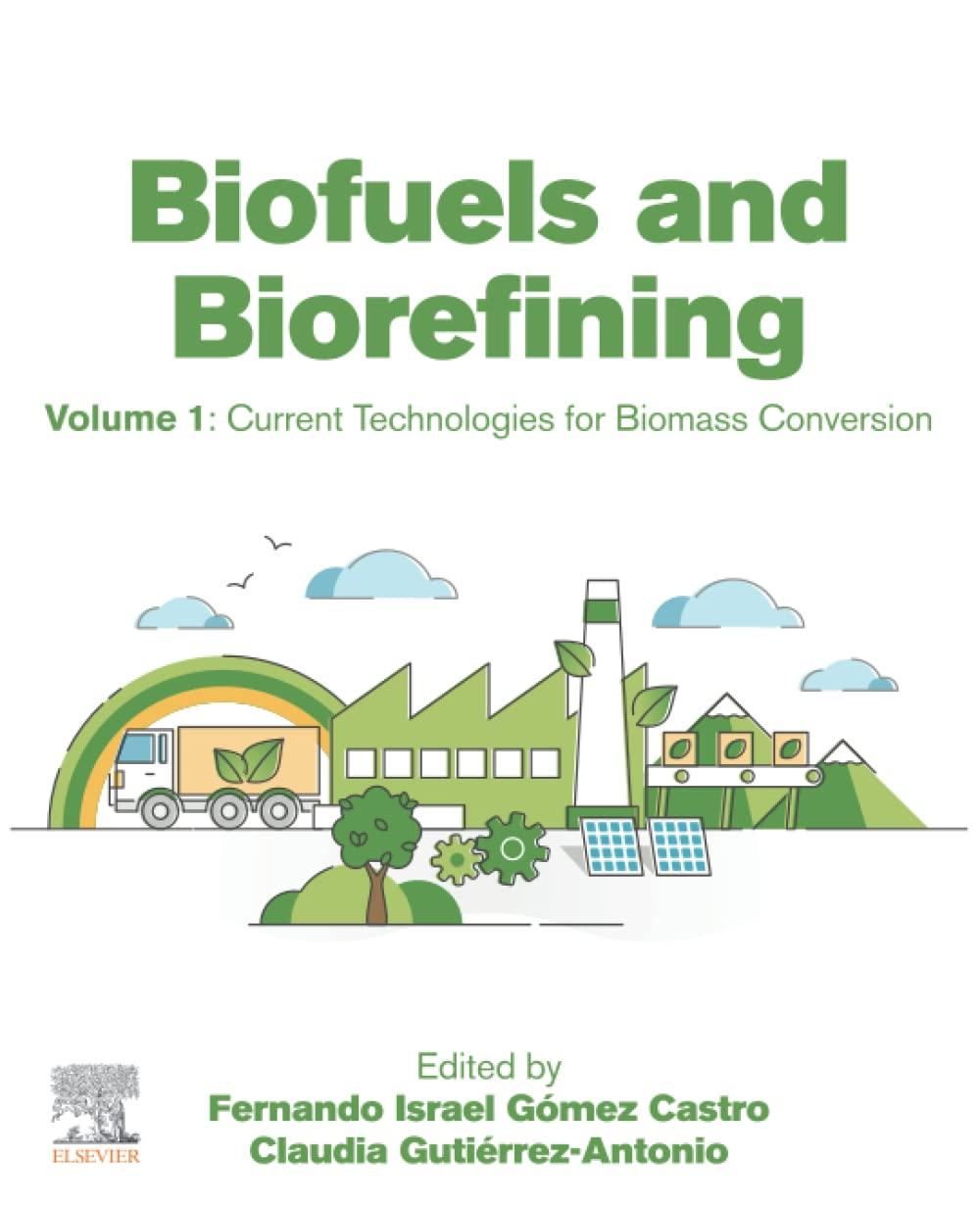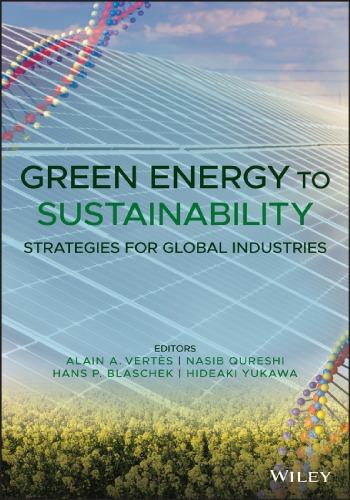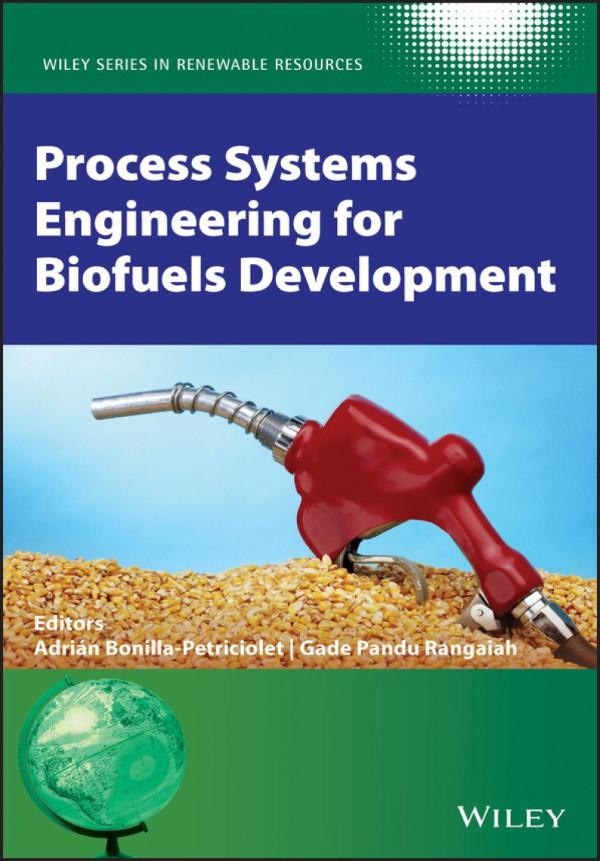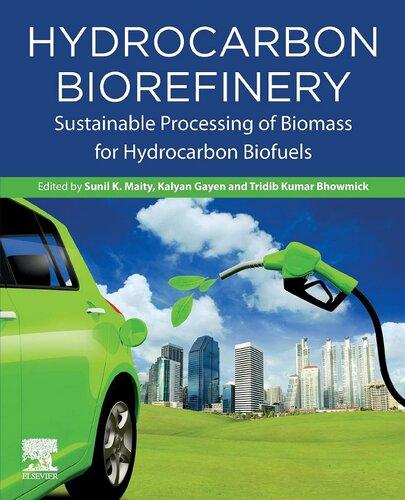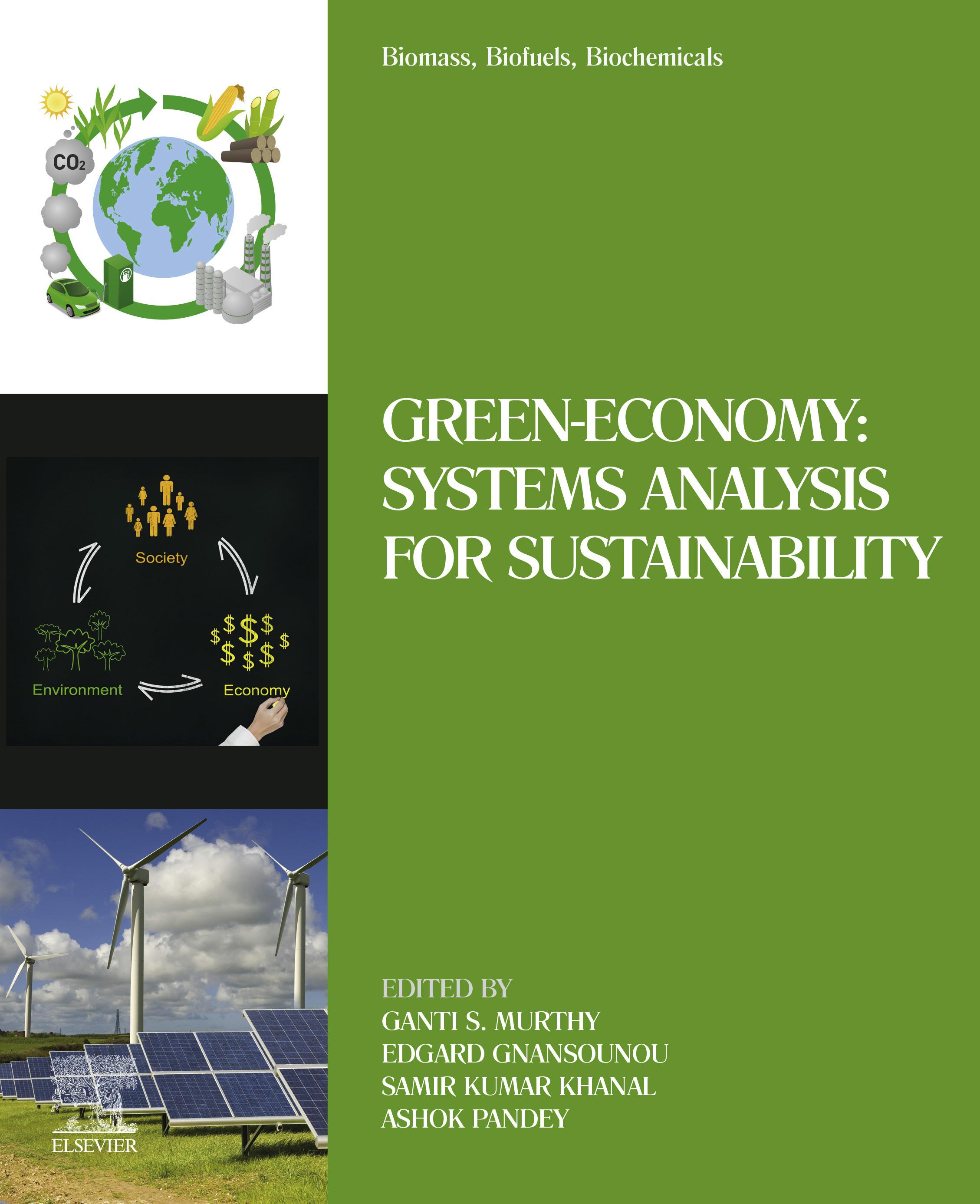BIOMASS, BIOFUELS, BIOCHEMICALS
Green-economy: SyStemS
AnAlySiS for SuStAinAbility
Edited
by
GANTI S. MURTHY
Biological and Ecological Engineering, Oregon State University, Corvallis, OR, United States; Biosciences and Biomedical Engineering, Indian Institute of Technology, Indore, India
EDGARD GNANSOUNOU
Ecole Polytechnique Fédérale de Lausanne (EPFL), School of Environment, Civil Engineering, and Architecture, Institute of Civil Engineering, Bioenergy and Energy Planning Research Group, Lausanne, Switzerland
SAMIR KUMAR KHANAL
Department of Molecular Biosciences & Bioengineering, University of Hawai’i at Manoa, Honolulu, USA; Department of Biology, Hong Kong Baptist University, Kowloon Tong, Hong Kong
ASHOK PANDEY
Centre for Innovation and Translational Research, CSIR-Indian Institute of Toxicology Research, Lucknow, India
Elsevier
Radarweg 29, PO Box 211, 1000 AE Amsterdam, Netherlands
The Boulevard, Langford Lane, Kidlington, Oxford OX5 1GB, United Kingdom 50 Hampshire Street, 5th Floor, Cambridge, MA 02139, United States
Copyright © 2022 Elsevier BV. All rights reserved.
No part of this publication may be reproduced or transmitted in any form or by any means, electronic or mechanical, including photocopying, recording, or any information storage and retrieval system, without permission in writing from the publisher. Details on how to seek permission, further information about the Publisher’s permissions policies and our arrangements with organizations such as the Copyright Clearance Center and the Copyright Licensing Agency, can be found at our website: www.elsevier.com/permissions
This book and the individual contributions contained in it are protected under copyright by the Publisher (other than as may be noted herein).
Notices
Knowledge and best practice in this field are constantly changing. As new research and experience broaden our understanding, changes in research methods, professional practices, or medical treatment may become necessary.
Practitioners and researchers must always rely on their own experience and knowledge in evaluating and using any information, methods, compounds, or experiments described herein. In using such information or methods they should be mindful of their own safety and the safety of others, including parties for whom they have a professional responsibility.
To the fullest extent of the law, neither the Publisher nor the authors, contributors, or editors, assume any liability for any injury and/or damage to persons or property as a matter of products liability, negligence or otherwise, or from any use or operation of any methods, products, instructions, or ideas contained in the material herein.
British Library
Cataloguing-in-Publication Data
A catalogue record for this book is available from the British Library
Library of Congress
Cataloging-in-Publication Data
A catalog record for this book is available from the Library of Congress
ISBN: 978-0-12-819242-9
For Information on all Elsevier publications visit our website at https://www.elsevier.com/books-and-journals
Publisher: Susan Dennis
Acquisitions Editor: Kostas Marinakis
Editorial Project Manager: Andrea Dulberger
Production Project Manager: Joy Christel Neumarin Honest Thangiah
Cover Designer: Greg Harris
Typeset by Aptara, New Delhi, India
4.
7.
5.4
7.1
7.4
8.
Edgard
9.
Ganti
9.1
11.
12.3
12.4
12.5
12.6
13. A case study on integrated systems analysis for biomethane use
Sarath C. Gowd, Deepak Kumar, Karthik Rajendran
13.1
13.2
13.3
13.4
14. Alternative ammonia production processes and the use of renewables
Gal Hochman, Alan Goldman, Frank A. Felder
14.1
14.3
14.4
14.5
15.
Edgard Gnansounou, Bénédicte Nsalambi
15.1
16. Advanced biofuels for transportation in West Africa: Common referential state-based strategies
Edgard Gnansounou, Elia Ruiz Pachón
16.1
16.2
16.3
16.4
16.5
17. Semantic sustainability characterization of biorefineries: A logic-based model
Edgard Gnansounou, Catarina M. Alves, Elia Ruiz Pachón, Pavel Vaskan 17.1
17.2
18.
Ashish Manandhar, Seyed Hashem Mousavi-Avval, Jaden Tatum, Esha Shrestha, Parisa Nazemi, Ajay Shah
18.1
18.2
18.5
18.7
18.8
18.9
19.
Prasad Mandade, Edgard Gnansounou
19.1
19.2
19.4
Contributors
Catarina M. Alves
Ecole Polytechnique Fédérale de Lausanne (EPFL), School of Environment, Civil Engineering, and Architecture, Institute of Civil Engineering, Bioenergy and Energy Planning Research Group, Lausanne, Switzerland
Frank A. Felder
Center for Energy, Economic & Environmental Policy, Edward J. Bloustein School of Planning and Public Policy, Rutgers, The State University of New Jersey, New Brunswick, NJ, United States
Edgard Gnansounou
Ecole Polytechnique Fédérale de Lausanne (EPFL), School of Environment, Civil Engineering, and Architecture, Institute of Civil Engineering, Bioenergy and Energy Planning Research Group, Lausanne, Switzerland
Alan Goldman
Department of Chemistry and Chemical Biology, Rutgers, The State University of New Jersey, New Brunswick, NJ, United States
Sarath C. Gowd
Department of Environmental Science, SRM University-AP, Amaravati, India; School of Engineering and Applied Sciences, SRM University-AP, Amaravati, India
Gal Hochman
Department of Agriculture, Food & Resource Economics, Rutgers, The State University of New Jersey, New Brunswick, NJ, United States
Deepak Kumar
Department of Chemical Engineering, State University of New York College of Environmental Science and Forestry, Syracuse, NY, United States
Ashish Manandhar
Department of Food, Agricultural and Biological Engineering, The Ohio State University, Wooster, OH, United States
Prasad Mandade
Ecole Polytechnique Fédérale de Lausanne (EPFL), School of Environment, Civil Engineering, and Architecture, Institute of Civil Engineering, Bioenergy and Energy Planning Research, Group, Lausanne, Switzerland
Seyed Hashem Mousavi-Avval
Department of Food, Agricultural and Biological Engineering, The Ohio State University, Wooster, OH, United States
Ganti S. Murthy
Biological and Ecological Engineering, Oregon State University, Corvallis, OR, United States; Biosciences and Biomedical Engineering, Indian Institute of Technology, Indore, India
Parisa Nazemi
Department of Food, Agricultural and Biological Engineering, The Ohio State University, Wooster, OH, United States
Bénédicte Nsalambi
Ecole Polytechnique Fédérale de Lausanne (EPFL), School of Environment, Civil Engineering, and Architecture, Institute of Civil Engineering, Bioenergy, and Energy Planning Research Group, Lausanne, Switzerland
Elia Ruiz Pachón
Ecole Polytechnique Fédérale de Lausanne (EPFL), School of Environment, Civil Engineering, and Architecture, Institute of Civil Engineering, Bioenergy and Energy Planning Research Group, Lausanne, Switzerland
Ashok Pandey
Centre for Innovation and Translational Research, CSIR-Indian Institute of Toxicology Research, Lucknow, India
Kyle Proctor
Biological and Ecological Engineering, Oregon State University, Corvallis, OR, United States
Karthik Rajendran
Department of Environmental Science, SRM University-AP, Amaravati, India
Ajay Shah
Department of Food, Agricultural and Biological Engineering, The Ohio State University, Wooster, OH, United States
Esha Shrestha
Department of Food, Agricultural and Biological Engineering, The Ohio State University, Wooster, OH, United States
Jaden Tatum
Department of Food, Agricultural and Biological Engineering, The Ohio State University, Wooster, OH, United States
Pavel Vaskan
Ecole Polytechnique Fédérale de Lausanne (EPFL), School of Environment, Civil Engineering, and Architecture, Institute of Civil Engineering, Bioenergy and Energy Planning Research Group, Lausanne, Switzerland
Preface
Assessing the sustainability of green economy focusing on the emerging bioeconomy is a strong imperative and is an integral part of evaluating new technologies, processes/unit operations, products, and policies. It is increasingly recognized by academia, industry, government, and society that sustainability is multifaceted, and interdisciplinary systems analysis approaches are required to provide a comprehensive understanding.Various elements of sustainability analysis include assessing technical feasibility, economic viability, environmental impacts, resource sustainability, and social aspects of engineered systems. Emerging green, circular economy, and bioeconomy concepts incorporating biofuels and bioproducts, resource recovery from wastes/residues and utilization of technologies must have a long-term sustainability focus right from ideation.
Increasingly, there is a recognition that comprehensive sustainability analysis is necessary for evaluating technologies/processes or policies for the emerging green economy. While the scientific literature has many examples of qualitative analyses, quantitative, and objective analyses are sorely lacking. This is due to a lack of necessary interdisciplinary integration in curriculums across the world. Individual aspects such as techno-economic analysis, sustainability analysis, policy aspects are covered in various disciplines; however, there are currently no books that address the systems analysis for sustainability comprehensively. This book addresses this critical gap in the available books for students and practitioners of sustainability analysis at the systems level.
Systems analysis for sustainability is an emerging discipline where any technologies/ processes or policies are evaluated comprehensively for sustainability. Trifold sustainability metrics such as technical feasibility, economic viability, and environmental impacts are commonly used to assess sustainability. In addition to these metrics, it is important to consider resource sustainability, policies, and social aspects for evaluating the sustainability of any proposed alternative. This approach results in identifying possible pitfalls early in the process so that truly sustainable alternative technologies, products, and policies can be formulated. This book provides a theoretical background to perform such analyses. It demonstrates the application of these principles in practice with case studies carefully chosen from around the world to emerging technologies in the green economy.
The book is written with a focus on enabling interdisciplinary understanding and cross-fertilization of ideas and methods from various disciplines. The book could be adopted as a reference book for interdisciplinary courses in environmental, ecological, chemical, and mechanical engineering disciplines. It is organized into two main sections. The first nine chapters of the book lay a comprehensive foundation for systems analysis of bioeconomy, and various methods used for performing systems analysis of biofuels. The chapters focus on techno-economic analysis, environmental impact assessments,
environmental risk analysis, resource sustainability analysis, policy, and social aspects, and general logic-based methods. The last chapter in the first part of the book discusses the emerging concept of resilience and resilience thinking in the context of adaptations to climate change and bioeconomy. All the chapters in the first part of the book present theoretical foundations for each technique, quantitative, and qualitative frameworks, and worked examples to aid the student in a solid understanding of these techniques. The second part of the book presents case studies from around the world starting with chapters focused on the liquid biofuels and solar energy potential for the United States and India. Two chapters are devoted to assessing the potential for various biofuels production in the African continent. The integrated analysis of biomethane in Ireland, solid biofuels production in the United States, utilization of winery residues is other case studies included in the second part of the book. With the increasing fraction of grid electricity being produced from the renewable sources, there is a need to utilize the excess electricity produced. One chapter specifically focuses on the decentralized ammonia production using excess renewable electricity thus potentially displacing the fossil fuel-dependent Haber–Bosch process. It is hoped that the reader will find these case studies provide concrete examples of the application of system analysis techniques for bioeconomy.
Preparing this book was indeed a challenge. As with any challenging project, this is a product of a wonderful team of authors with excellent teamwork. We would like to thank all the authors for their participation in the preparation of the chapters. We would like to acknowledge the reviewers for their constructive comments. We thank the entire Elsevier team led by Dr. Marianakis Kostas, Senior Book Acquisition Editor and Andrea Dulberger, Editorial Project Manager for their patience, understanding, and help during this long and arduous process of completing this book. We sincerely hope this book will be useful to senior undergraduate students, beginning graduate students, and researchers.
Editors
Ganti S. Murthy
Edgard Gnansounou
Samir Kumar Khanal
Ashok Pandey
Another random document with no related content on Scribd:
